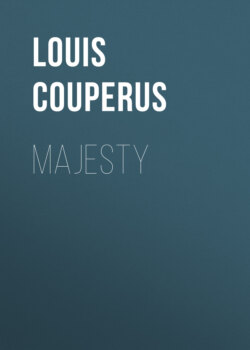Читать книгу Majesty - Louis Couperus - Страница 11
На сайте Литреса книга снята с продажи.
5
ОглавлениеTable of Contents
In changed uniforms, a short dinner with the high prelate; a few canons and minor ecclesiastics sit down with them. The room is large and sombre, barely lighted with a feeble glimmer of candles; the silver gleams dully on the dressers of old black oak; the frescoes on the walls—sacred subjects—are barely distinguishable. A silent haste quickens the jaws; the conversation is conducted in an undertone; the servants, in their dark livery, move as though on tiptoe. The cardinal, on either side of whom the princes are seated, is tall and thin, with a refined, ascetic face and the steel-blue eyes of an enthusiast; his voice issues from low down in his throat, like that of an oracle; he says something of the Lord's will and makes a submissive gesture with both hands, the fingers lightly outspread, as Jesus does in the old pictures. One of the priests, the cardinal's private secretary, a young man with a round, pink face and soft, white hands, laughs rather loudly at a joke of Prince Dutri, who, sitting next to him, tells a story about a countess in Lipara whom they both know. The cardinal casts a stern glance at the frivolous secretary.
After the hurried dinner, the princes and their suite ride into the town on horseback, cheered wherever they go. The water already mounts close to the cathedral and the Archiepiscopal Palace. Groups of men, women and children, sobbing, flow towards the prince, as he rides across the dark squares; they carry torches about him, as the gas is not everywhere lighted; the ruddy flares look strange, romantic, over the ancient dark mass of the walls and are reflected with long streaks of blood in the water lying in the narrow alleys. A large house of many storeys and rows of little windows appears to have suddenly gone under: a sudden mysterious pressure of water, filtering from the foundations through the masonry of the cellars, making its treacherous way through the least crack or crevice. The inhabitants save themselves in skiffs, which pass with little red lights through the black, watery town; a child cries at the top of its voice. They are poor people there in hundreds, living, packed as in boxes. The princes alight and step into a boat and are rowed to the spot; it becomes known who they are; they themselves help an old woman with three children, all wet to the waist, to climb on to a raft; they themselves give them money, shout instructions to them. And they point to the old fortress of St. Ladislas as a refuge....
But a cry arises, farther on, a cry at first not clearly perceived in the darkness of the evening, then at last distinctly audible:
"The Therezia Dyke! The Therezia Dyke!..."
The princes want to go there; it is not possible on horseback; the only way is in boats. Prince Herman himself grasps the sculls; in the next boat Dutri declares to Von Fest, one of the Gothlandic equerries, that, taken all round, he thinks Venice more comfortable....
"The Therezia Dyke! The Therezia Dyke!..."
The dyke lies like the black back of a great, long beast just outside the town, on the left bank of the Zanthos, and protects the whole St. Therezia district, the eastern portion of the city, which stands tolerably high, from the river, which generally overflows in springtime. The boats glide over the water-streets; a landing is possible in the Therezia Square; lanterns are burning; torches flare, ruddy scintillations dart over the water. The square is large and wide; the houses stand black round about it and surround it in the night with their irregular lines of gables and chimneys, with the massive pile of the church of St. Therezia, whose steeples are lost in the dark sky; in the centre of the square rises a great equestrian statue of a Liparian emperor, gigantic in motionless bronze, stretching one arm, sword in hand, over the petty swarming of the crowd.
Othomar and Herman have sent their three equerries, Dutri, Leoni and Von Fest, for whom horses have been found and saddled, to the dyke, which protects a whole suburb of villas, factories and the St. Therezia railway-station against the waters of the Zanthos, which has already poured its right bank over the country and is drowning it. The princes stand in the middle of the square on the steps of the pedestal of the statue; they would have liked to go on farther, but the mayor himself has begged them to stay where they are: farther on mortal danger threatens at every moment.... All that could be done has been done; there is nothing more to do but wait.
Quarters of an hour, half-hours, pass. This waiting for terrible news calms them; they hope afresh. The officers ride to and fro; the villas and factories yonder are deserted: a whole town lies empty, forsaken. Prince Dutri, turning his horse, which he has ridden out of breath, assures them that the embankment will hold firm; after he has spoken with the princes, he is surrounded: it is the occupiers of the villas, the manufacturers, who overwhelm him with questions, fortified by the self-assurance of the imperial equerry. Dutri gallops off once more.
